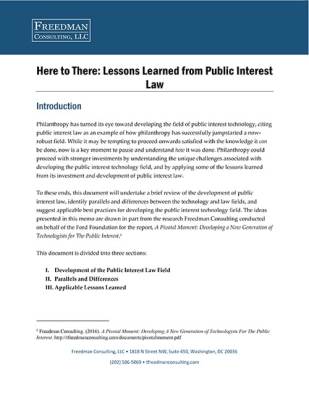Public interest technology and its origins

Technology is woven into every aspect of our society and holds promise to unlock human potential in ways that seemed impossible mere decades ago. Yet this rapid transformation has far outpaced government services and regulation, legal jurisdiction, public understanding and corporate norms, leaving us all exposed to unchecked harms.
Public interest technology (PIT) is a growing field made up of technologists who work to ensure technology is created and used responsibly. These technologists call out where technology can improve for the public good, and sometimes question whether certain technologies should be created at all. Technologists are defined not only as engineers, but also include those individuals and organizations with strong perspectives and expertise on the creation, governance and application of technology—from designers to legal experts to artists, activists, and members of communities where technology is deployed.
Public interest technologists seek to center the perspectives of historically marginalized groups—including Black, Indigenous and people of color, women and the disability community—because they are most harmed by technology but also have the knowledge and experience to ensure technology advances justice. PIT combines these perspectives with a knowledge of the way technology works and an understanding of the ethical, legal, policy and societal concerns that shape our world.
Modeled after the framework of public interest law, public interest technology works to ensure technology is designed, deployed, and regulated in a way that protects and improves the lives of people, centering values of equity, inclusion, and accountability where the public interest is at stake.
Our commitment to public interest technology arose out of a strategy to promote internet rights and digital justice that dates back to the early 2010s. Since 2016, we have committed over $100 million to public interest technology to build an ecosystem that will lead to a more just technological future for all.
More about our work:
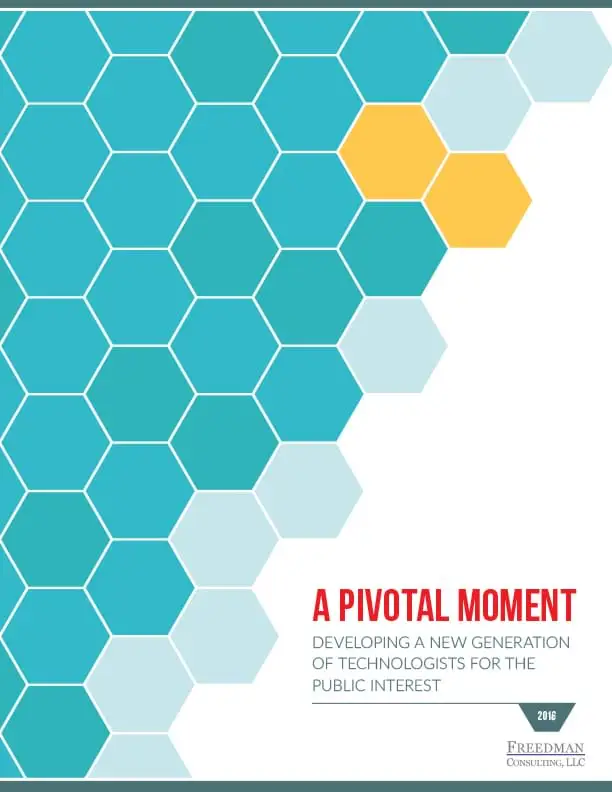
A Pivotal Moment: Developing a New Generation of Technologists for the Public Interest
This report identifies opportunities to improve technology capacity and talent of those working on behalf of the public interest. It was developed with support from the NetGain partnership and draws on 60 interviews with field experts, scholars, and policy leaders. The interventions in the report may be implemented by a variety of stakeholders and target a diverse set of elements of public interest technology.
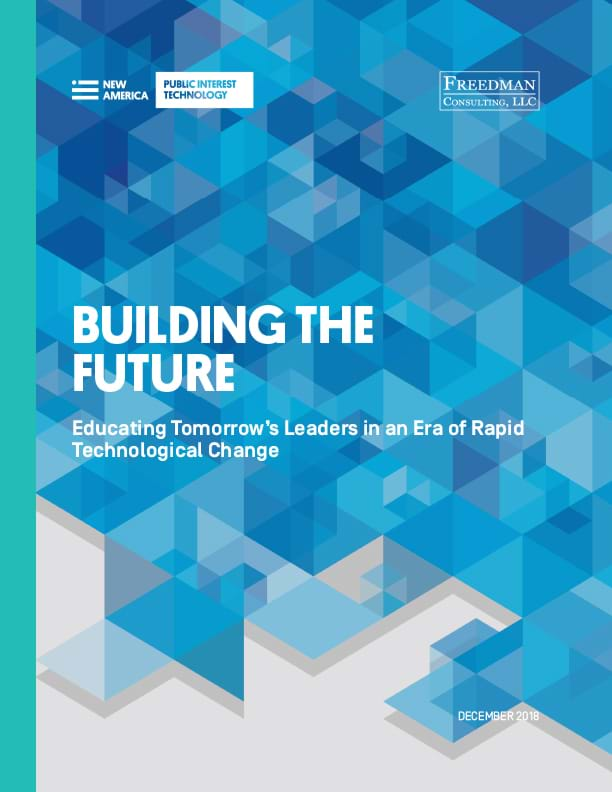
Building the Future: Educating Tomorrow’s Leaders in an Era of Rapid Technological Change in Reports
The Building the Future report made a strong case for the need to create a community of practitioners invested in exploring and building the nascent field of public interest technology. Through 17 in-depth interviews, academics and practitioners shared that a key barrier to growing the field was a lack of shared principles, goals, or even a definition of public interest technology as an academic discipline.

A Future of Failure? The Flow of Technology Talent into Government and Civil Society
This report explores the talent pipeline that connects technology experts to careers in government and civil society, providing an unvarnished assessment of the pipeline’s current state. It looks at the critical barriers to developing technology-oriented human capital in government and civil society while offering models of successful interventions and recommendations for a more robust pipeline.
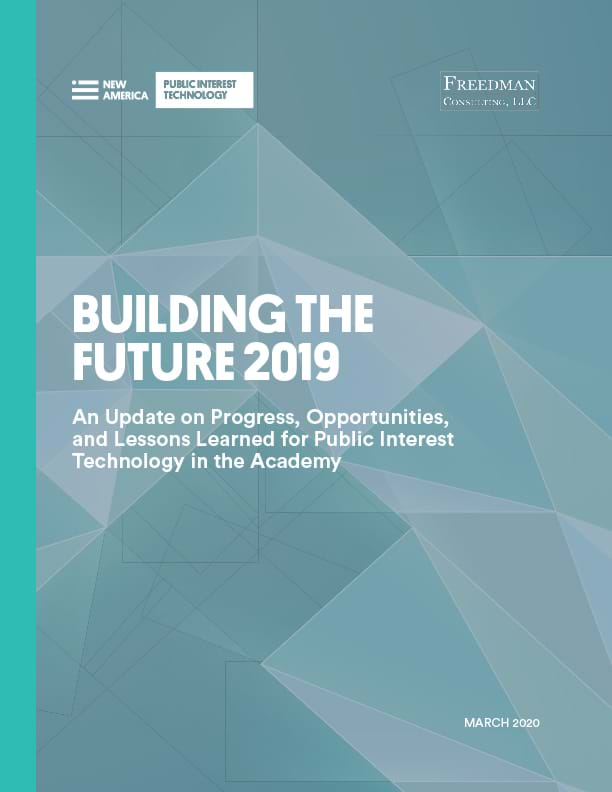
Building the Future 2020
Drawing from interviews with 30 practitioners and leaders, this Ford-supported report highlights key moments in the growth of the maturing public interest technology ecosystem. This 2019 update of the 2018 report follows the trajectory of the Public Interest Technology University Network (PIT-UN), from an intangible hope for the field to a robust collaboration that enables leaders from institutions of higher education to share best practices and spur collaboration. The network held its first annual convening at Georgetown University in October 2019, at which over $3.1 million in PIT grants were announced, and it has only continued to grow.
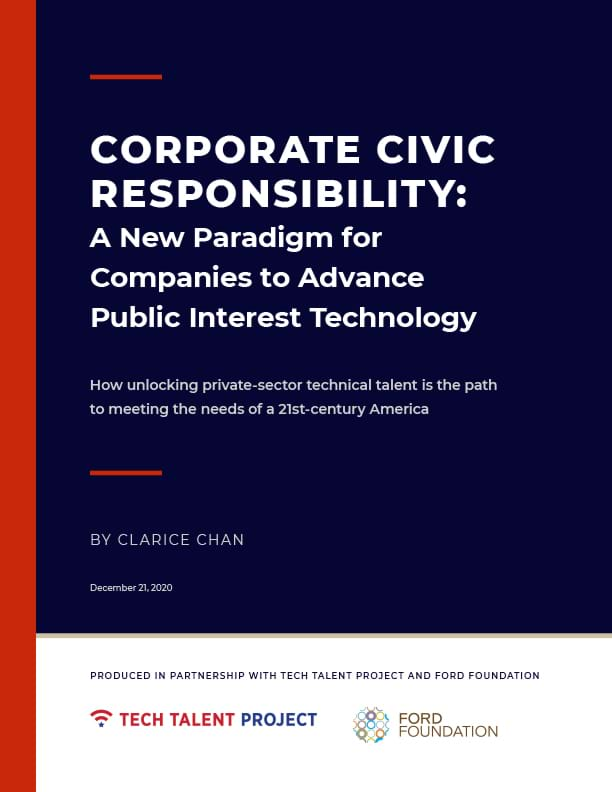
Corporate Civic Responsibility: A New Paradigm for Companies to Advance Public Interest Technology
Clarice Chan took a civic leave sabbatical from her role at Microsoft to serve as a White House Presidential Innovation Fellow. Upon completion of her fellowship, Chan partnered with the Tech Talent Project and Ford Foundation to produce this paper about the urgent need to bring technical talent into government. The paper also demonstrates what Ford learned from its investments in developing public interest law and applies those lessons to public interest tech, namely that public-private partnerships benefit the private sector because technologists return to their permanent positions with a greater understanding about government and its functions.
Stanford Social Innovation Review
Putting the Public Interest in Front of Technology
The Chronicle of Philanthropy
Putting the Public Interest in Front of Technology
Stanford Social Innovation Review
Putting the Public Interest in Front of Technology

